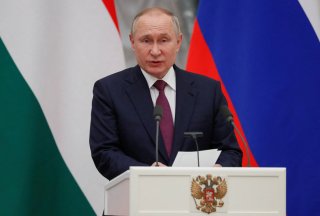Putin Accuses the West of Ignoring Russia's Security Concerns
The Russian leader also accused NATO of failing to live up to its past commitments.
In his first public statement regarding the Ukraine crisis since December, Russian president Vladimir Putin criticized the United States and NATO for allegedly maintaining a hostile posture against Russia in the post-Cold War era.
In a joint press conference with Hungarian prime minister Viktor Orban on Tuesday, Putin briefly described Russia’s motivations for deploying more than 130,000 troops to the country’s border with Ukraine. He argued that U.S. attempts to negotiate had so far “ignored” a series of demands that Russia regards as necessary to withdraw its troops: an affirmative commitment to end NATO’s eastward expansion and an agreement not to deploy missiles or other military infrastructure in Eastern Europe.
However, the Russian leader acknowledged that further diplomacy could lead to a resolution that would satisfy the Kremlin’s security concerns and advised that the talks go on.
“I hope that dialogue will continue,” Putin told reporters at the press conference, though he acknowledged that finding an agreement would “not be easy” given the two sides’ differing positions on Ukraine.
The United States and NATO have rejected the central demand, an end to NATO expansion, arguing that no external country should have a veto over NATO membership. U.S. negotiators have also refused a Russian request to use America’s veto power within NATO to prevent a Ukrainian accession.
In spite of the seemingly unbridgeable gap between the two sides’ positions—with Washington and Brussels rejecting a demand that Moscow views as essential—negotiations have continued over other issues, including restrictions on NATO’s military movements and missile deployment in Eastern Europe. Russian foreign minister Sergei Lavrov described these as “secondary issues” last week, but indicated that talks would continue.
In his remarks, Putin also claimed that NATO broke trust with Moscow, alleging that the alliance had promised Russian leaders in the 1990s that it would not expand NATO into the former Soviet bloc. Although this promise was never set in stone, and much of the impetus for NATO’s expansion came from the former Soviet bloc states themselves, the argument has been repeated by others, including former Soviet leader Mikhail Gorbachev.
Putin also criticized the deployment of U.S. missile batteries in Poland and Romania, both of which he argued were within range of targets within Russia and should be moved westward.
The United States has stated that it does not plan to use the missile systems, but the Russian leader rejected this argument, noting that Western leaders had dismissed his assurances that he does not plan to invade Ukraine.
Trevor Filseth is a current and foreign affairs writer for the National Interest.
Image: Reuters.

